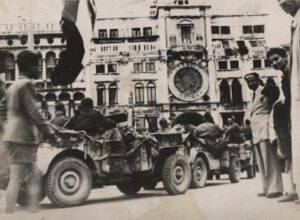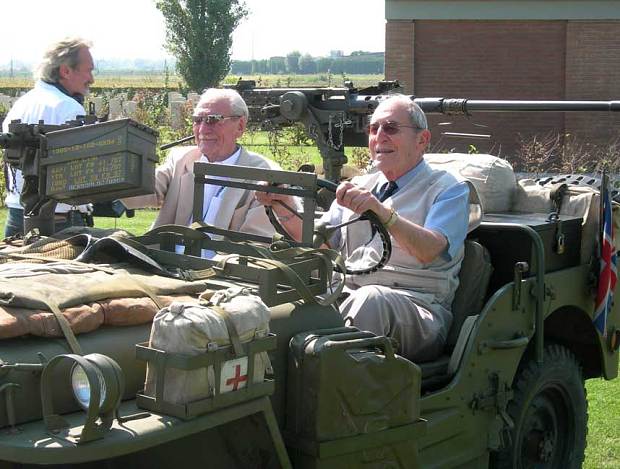With events to mark the 80th anniversary of VE Day this week – both in Rye and across the UK – it’s time to remember what the wartime generation fought for and their post-war legacy says Guy Harris.
Twenty years ago, I stood in St Mark’s Square, Venice, with a small band of British World War Two veterans. They had last been in the Piazza in 1945 with their unit, which bore the improbable name, Popski’s Private Army. My friend Suzi Paterson and I were lucky enough to share that moment with them as we’d succeeded in raising funding under the National Lottery’s Heroes Return Fund. We had organised a pilgrimage for veterans and families, and it had taken us back to some of the many places in which they had fought the Nazis and their allies.
After battling fascism in North Africa and all the way up the boot of Italy, the unit’s final flourish was to land their Jeeps from lighters drawn up on Venice’s Grand Canal, and to drive them jubilantly around the famous square. They were remarkably silent in 2005, lost, I imagined, in their recollections. The black and white photos of that far-off day depict amused Italian civilians watching the British soldiers, and children running excitedly behind the Jeeps.
Two decades later, the veterans I knew have all passed away, and today many of us struggle to imagine what the end of total war must have felt like: relief while mourning loss; the slow draining away of mortal fear; the bracing of oneself to the immense works ahead…
And yet today, the spectre of ultra-nationalism, genocide, invasion, occupation and dictatorship looms large again. So, this VE Day there is much to reflect deeply upon.

After WWII Britain led the effort to build an international rules-based order to protect the hard-won peace that our grandparents and great grandparents had literally fought and died for; that our country had been bombed into rubble for; that our coffers had been emptied for. Additional to these legal frameworks for justice, peace, self-determination and human rights, Britain built the architecture of public health on the blueprint of the Beveridge Report, commissioned by the wartime coalition government. And we built homes fit for a nation of heroes so that ordinary families could live in dignity. We had won the war, and during the post-war consensus, we endeavoured to win the peace.
Today, we shouldn’t let sentimentality or toxified nostalgia detract from the challenges and privations of the 1940s and 50s, but we should be clear what those sacrifices were made for. The laws, rights and values installed after the second world war are the memorials to British, Commonwealth and Dominion dead, and they are the memorial to the millions exterminated in the Holocaust. They are the armour that today protect us and our children from over-mighty government and from dictators far and near.
Those protections are memorials not to our basest human instincts but to our highest human instincts as British people. In times of inequality, poverty and deep uncertainty, those higher instincts are sometimes hard to muster. Indeed, there are those who, for their own ends, would lure us to betray our British values. But the spirit of the wartime generation shows that our highest instincts can be mustered, even in the face of fear and insecurity, and despite the siren voices of demented dictators and their cynical, self-interested disciples, who may pose as patriots but are anything but.
Today, those who would demolish democracy and tear down our protections clearly do not understand what Britain’s existential fight between 1939-45 was for. Nor can they really value it, other than as a cynical propaganda tool. When we recall the victory against Nazism on May 8, we should remember that the names graven on the war memorials standing in our villages and towns mark individual human sacrifice in the fight against intolerance, hatred, racism and authoritarianism. Those sacrifices embody true British values, fought for by decent British men and women, like the men I joined in Venice in 2005.
As democracy is tested at home and abroad, on this 80th anniversary of VE Day, let’s remember what our forebears and families were fighting for, and, in particular, what they were fighting against. And let’s rise to their example in the coming years.
Rye News welcomes all opinion pieces on issues that affect life in Rye and the surrounding villages. If you would like to add yours to our Opinions section email info@ryenews.org.uk.
Image Credits: Guy Harris , Friends of Popski's Private Army .




Great piece- and timely in view of what is currently happening in America and threatens to happen here if the angry voices in the distance are to be believed.
I note the asterisk next to “MC” under the photo caption has been edited. That modest little asterisk has a very big meaning – it indicates that John had not one Military Cross for gallantry, but two… One for leading an assault on a German command post, the other for charging a battery of German 88mm guns in his Jeep. It should read, “Maj. John Campbell MC*”. John was not only a hero, he was a lovely man, as was Douglas, who, incidentally, resided in Sussex.
Rectified! Thank you for pointing this out.
Thank you Guy Harris and also Rye News for giving us this really thoughtful and meaningful piece.